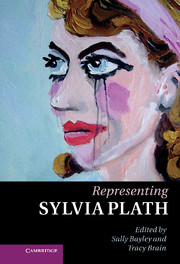Book contents
- Frontmatter
- Contents
- Illustrations
- Notes on contributors
- Acknowledgements
- Abbreviations
- Introduction
- Part I Contexts
- Chapter 1 ‘Mailed into space’
- Chapter 2 ‘The photographic chamber of the eye’
- Chapter 3 ‘O the tangles of that old bed’: fantasies of incest and the ‘Daddy’ narrative in Ariel
- Chapter 4 Plath and torture: cultural contexts for Plath’s imagery of the Holocaust
- Part II Poetics and composition
- Part III Representation
- Bibliography
- Index
- References
Chapter 1 - ‘Mailed into space’
on Sylvia Plath’s letters
from Part I - Contexts
Published online by Cambridge University Press: 07 September 2011
- Frontmatter
- Contents
- Illustrations
- Notes on contributors
- Acknowledgements
- Abbreviations
- Introduction
- Part I Contexts
- Chapter 1 ‘Mailed into space’
- Chapter 2 ‘The photographic chamber of the eye’
- Chapter 3 ‘O the tangles of that old bed’: fantasies of incest and the ‘Daddy’ narrative in Ariel
- Chapter 4 Plath and torture: cultural contexts for Plath’s imagery of the Holocaust
- Part II Poetics and composition
- Part III Representation
- Bibliography
- Index
- References
Summary
Sylvia Plath is hardly ever celebrated for her letter writing. In fact, letter writing is usually considered to be one of the few literary genres she never mastered. Whereas Plath’s other writings exist in at least two or more versions, the majority of her letters remain unpublished. Letters Home (1976), a selection of letters written mostly to her mother, is the only edition of her correspondence in print. That said, there are more than enough letters in the public domain to revisit this side of Plath’s writing life, challenging the idea that Plath was an endlessly cheerful but essentially immature epistolary writer. The letters are far less conventional than have been previously assumed, particularly in their frequent subversion of epistolary conventions. Virginia Woolf, one of Plath’s most important influences, viewed letter writing as a selfless activity that flattered the recipient, giving back ‘a reflection of the other person’, but also saw it as an egotistical affair, like staring at a looking glass. ‘This sheet is a glass,’ Woolf once told Ethel Smyth. Plath employed letters quite consciously for just this dual purpose, using them both to flatter the recipient’s vanity and show off her own writing achievements. But it is precisely as writing that her letters are rarely read.
- Type
- Chapter
- Information
- Representing Sylvia Plath , pp. 13 - 31Publisher: Cambridge University PressPrint publication year: 2011
References
- 3
- Cited by



